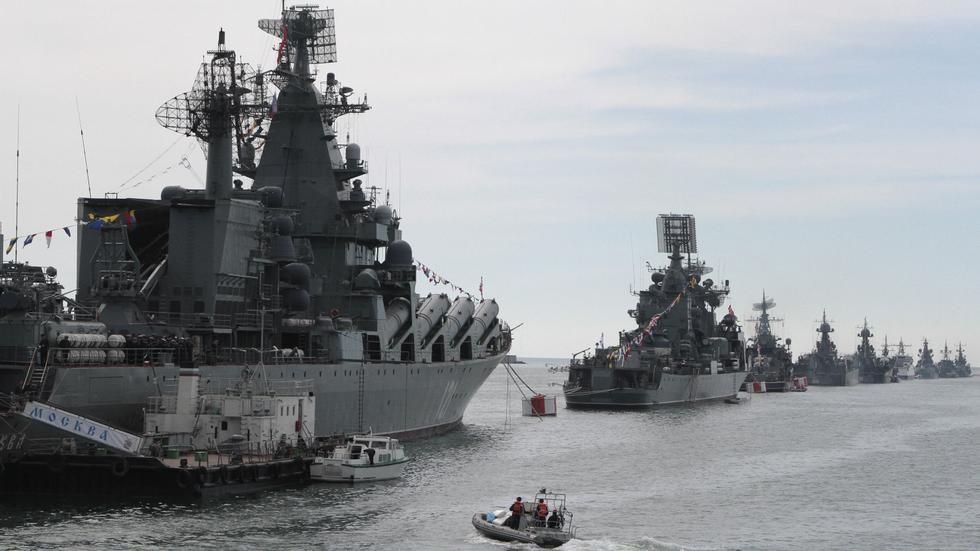April 13, 2022 will forever remain one of the darkest days in the Russian Navy.
The Moskva was considered the flagship of the Russian Black Sea Fleet. He was considered almost invincible. But that was before the Ukrainian missiles recorded two complete collisions with the cruiser’s hull.
Here you can read all about the war in Ukraine
Thought they were out of range
Of a crew of 500, more than 100 are said to have perished in the dramatic sinking.
On this fateful day, the weather and visibility must have been very bad. The cruiser is equipped with advanced air defense systems and other security systems on board.
Therefore, the officers may have felt safe and chose to sail twelve miles from the Ukrainian mainland. What they did not take into account was that the Ukrainians were planning a surprise attack.
– It is this overconfidence that ultimately doomed them, says an unnamed Ukrainian missile expert Ukrainian Pravda.
Repel missile attacks

Russian President Vladimir Putin watches a missile launch during a naval exercise in the Russian Arctic. Photo: Itar-Tass / Reuters
A Ukrainian defense spokesman said lifeboats were unable to reach the burning ship, which contributed to the deaths of many crew members in the sea of flames or drowning.
According to the Russian Ministry of Defense, the sinking was caused by an explosion of ammunition on board, and not by an attack from outside.
On the other hand, the Ukrainian authorities assert that their missiles were the fate of “Moscow”.
– The Neptune missiles guarding the Black Sea caused severe damage to the Russian ship. Long live Ukraine, Odessa Governor Maksim Marchenko wrote in the Telegram message service on the same day the ship sank.
“Nature itself helped Ukraine on April 13”
Ukrainska Pravda conducted a series of interviews with members of the Ukrainian military, in order to reconstruct how Ukrainian Neptun missiles could have hit “Moscow”.
“It was nature itself that helped Ukraine on April 13. The Neptune operator should not have arrived in Moscow with a basic radar system, but it really did.”
After issuing the command to launch and firing two Neptune missiles in the direction of the Russian cruiser, it was calculated that they had reached their target after only six minutes.
Hit the target against all odds
The operator of the Neptune coastal defense missile system received unexpected data on the radar at 16:00 on April 13, 2022. The radar showed a large target about 120 kilometers from the ground. The operator quickly realized that only one thing of this size could be in this sector of the Black Sea, the flagship of the Black Sea Fleet, the cruiser Moskva.
“Because of the thick clouds hovering over the sea, the radar signal was deflected to the surface of the water and vice versa. We had no radar across the horizon, and Russia knew that. But since the clouds were so low, the signal had nowhere to go from that passage between the water and the clouds.” , the radar unexpectedly reached “Moscow”, explained the sources of Ukraine’s Pravda.
It may have received assistance from allied surveillance aircraft
Although the Russians were confident that they were out of range of the Ukrainian forces, they probably did not have anti-aircraft systems on board.
“But even if they had, they would have had a lot of trouble with Neptune rockets. Neptun is a subsonic liquid-fuel rocket that sneaks onto a ship undetected until the last moment. Until it’s too late,” the paper writes.
New York times He wrote on May 5 that a Poseidon reconnaissance aircraft was likely involved in providing Ukraine with the exact coordinates before the attack took place, but this has not been confirmed. Ukrainian military spokesmen underestimated the Allied assistance, and believe that the Ukrainian forces handled the operation on their own.
SMS: “Moscow is over”
And after the attack, and “Moscow” caught fire, no one knew if the target was hit. In the end it became clear that a number of ships had changed position and headed towards the cruiser, which was in distress. In the end, confirmation came from the Kremlin that “Moscow” was in serious trouble.
It is not known how long it took before the “Moskva” began its voyage towards the bottom of the Black Sea, but attempts to rescue the cruiser proved impossible given the bad weather.
“Moscow is over,” a Ukrainian security source wrote via SMS to Ukrainska Pravda.

The Russian Black Sea Fleet was among Putin’s pride. Here the flotilla is photographed off the Crimean peninsula during Victory Day in 2014. Photo: Stringer/Reuters/NTB

“Organizer. Social media geek. General communicator. Bacon scholar. Proud pop culture trailblazer.”

